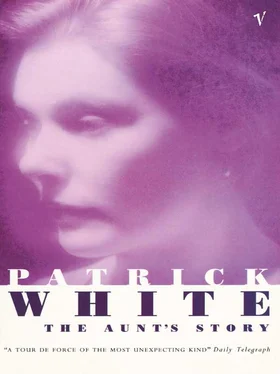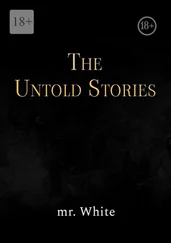‘Let us go now,’ they said.
‘Yes,’ they sighed. ‘Let us go.’
They took the baskets. It was a long stretch of sand, and between trees.
‘Katina, Katina, we are going,’ called Miss Grigg.
‘Yes, I am coming,’ Katina Pavlou said.
She followed the flat figures, but at a distance, because other lives are flat and external. Katina Pavlou trailed her hand against the trunks of trees.
‘What is it, Katina?’ Theodora Goodman asked.
Though fingers told that questions were superfluous. The hands held the answer. The hands were hot.
‘It is nothing, Miss Goodman,’ Katina Pavlou smiled. ‘Look at this blue. I am blind.’
Then they walked. Theodora knew that they had reached perfection. She felt Katina Pavlou, who was heavy and warm with some inner perfection of her own. But perfection, alas, is breakable, whether it is marble, or terracotta, or the more fragile groups of human statuary.
‘How far is Africa, do you suppose?’ Katina Pavlou asked.
‘Far enough,’ Theodora Goodman said.
OFTEN enough Theodora wondered whether it was time for her to go. There were days when faces did not open. She heard the hedge of knitting needles in the lounge. In the strict space of her chambre modeste , where confort moderne refused at times to flow, she opened the suitcase and smelled its emptiness. There was also the sheets of the Corriere della Sera she had used after losing her shoe-bag in Siena. But Theodora did not leave. The melancholy fact of emptiness was not enough. She waited for some act that still had to be performed.
Au mois d’avril il est gai, au mois de juin on mène une vie assez tranquille, au mois d’octobre l’air fait du bien , Monsieur Durand used to say, to meet emergencies.
Monsieur Durand suggested seasons with the bland conviction of his own brochure. Because there are certain conventions of expression and behaviour to be observed, even by those guests who look out of windows, or yawn, or thoughtfully trace the veins of a plant.
That is all very well, and true, Monsieur Durand, Theodora would have said, but you forget how you bared your teeth one morning in the glass, and wondered whether their desperation would bite, or whether your tongue, branching suddenly and peculiarly from your mouth, might not be uprooted by the hand like any other fungus, all this you forget, Monsieur Durand, and that I saw, and how we agreed, in silence, that it was too insignificant to remember.
But Theodora did not say. She folded her receipt, for another week, gravely, edge to edge, and went outside, because it was inevitable, into the jardin exotique .
Pervading the stiff, and at the same time fleshy, forms of the garden, the morning was bright, cheerful, tinkling. The garden gave up no secrets, if it had secrets to give. Brooms had made correct patterns on the gravel, and the natural occurrences of dew and mist had sponged the pig’s face and washed the aloe down. There was no visible disorder, except that on the benches the occasional droppings of birds blinded with their whiteness, and from a cactus sword hung what was either a spider’s web or an unfinished doily.
Theodora looked closer to discover which.
‘You are quite right, Miss Goodman,’ Wetherby said. ‘It is six afternoons from the life of the Demoiselles Bloch. Doilies do escape.’
‘Oh,’ said Theodora. ‘Yes.’
She was neither prepared nor altogether pleased. She picked the doily off the cactus, as if it were her duty to hide the meeker weaknesses of others. Reddening a little, she put it in her bag, to return later in the morning to its rightful reticule.
‘The Demoiselles Bloch,’ she said, ‘often have trouble with their things.’
‘How right, how right,’ said Wetherby.
He was reading the Continental Daily Mail . This morning he was a thin young man in a tweed coat, of which the elbows had leather patches. Under the thick forelock of nondescript hair, which gave him the expression of a goat that prefers to consume tins, his face absorbed news, while remaining superior to events. Wetherby was immune.
‘What is the news?’ asked Theodora, because it was the least she could do to cover her dislike.
‘The body of a dancer has been discovered, in a parcel, in a cloakroom of the London tube,’ Wetherby said. ‘The Führer is annexing somewhere else, and half America has turned to dust. Now, Miss Goodman, shall you go or stay?’
‘Then you do sometimes relate the personal to the universal,’ Theodora said.
‘I am sometimes forced to, by the people who disapprove,’ Wetherby replied. ‘But oh Lord, it is early. It is too early to plunge. My stomach is full of breakfast. Let us observe instead the advantages of our zinc surroundings. It is all that a garden ought to be, neat and not native, resourcefully planned, as opposed to dankly imaginative. Preserve me from the swish of dead leaves and urns full of torn letters.’
He was pleased by his own facetiousness, Theodora heard. Its bright metal cannoned down the paths.
‘But you are not pleased, Miss Goodman,’ Wetherby said. ‘You will not be pleased while I am I.’
His squamous hands were increasing her disgust.
‘I could not be more indifferent,’ Theodora said, ‘if you chose to be x or y .’
Algebra, she felt, with Lou, would remain her chiefest torture.
‘Tell me something, Miss Goodman. Tell me the truth. If I could have loved Katina Pavlou just as she leapt from your imagination, clothed in white, and all the nostalgia of what has never happened, then it might have been different.’
But now Theodora trembled for the dark. Now the garden raised its swords. She avoided Wetherby, but Wetherby pursued.
‘Perhaps in different circumstances I would have lain with my head in your lap, and discussed Tennyson and Morris. But the escalators have carried us apart. And now, Miss Goodman, the times have turned sour. I think I am right in saying of love that the most one can expect is the logical conclusion.’
Theodora laughed. Now she could not control her dark moustache. It was a fierce and hateful thing. But the eyes of Wetherby were clear as mirrors.
‘Not that one does not continue to hope,’ he said. ‘I am obsessed.’
‘Yes, you will continue,’ Theodora laughed. ‘You will love your obsession. You will love the faces of mirrors. You will love your own anxiety.’
Sitting on the bench in the jardin exotique , Theodora Goodman and Wetherby looked at each other, like two people coming out of a tunnel, rediscovering each other’s features, as if there had been no exchange of darkness. He was a pale young man in a tweed coat. She was a sallow spinster of forty-five.
Wetherby looked at his wrist.
‘Soon it will be time for the postman,’ he said. ‘I am expecting a letter from Muriel Leese-Leese. She keeps me here, you know, ostensibly for my health, though actually so that she may enjoy the pleasure of torturing herself by correspondence. She is lost without her daily twinge.’
‘And after that,’ said Theodora, ‘you will find it is time for lunch. How the morning passes.’
Wetherby folded the Daily Mail .
‘I shall not be here for lunch,’ he said. ‘I am going to walk along the coast with Katina Pavlou, to the round tower which has some connection with Napoleon.’
‘It has, they say,’ Theodora said.
The tower to which the Demoiselles Bloch walked occasionally, in strong boots and overcoats. Theodora herself had never been as far as the tower, but she suspected it. Especially now. She suspected the dark smell of damp stone and possibly a dead bird. She loathed the folded body of the dead bird, and the maggots in its eyes.
Читать дальше












